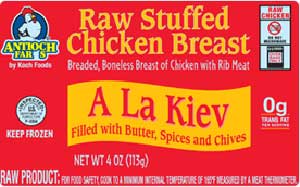 After being linked to a Salmonella outbreak that prompted recalls of 2.5 million pounds of chicken products, Aspen Foods of Chicago says it is laying off 65 employees. Since May, five people in Minnesota developed Salmonella infections after eating the breaded chicken products produced by Aspen, which is owned by Koch Food Group.
After being linked to a Salmonella outbreak that prompted recalls of 2.5 million pounds of chicken products, Aspen Foods of Chicago says it is laying off 65 employees. Since May, five people in Minnesota developed Salmonella infections after eating the breaded chicken products produced by Aspen, which is owned by Koch Food Group.
This is at least the third time Salmonella illnesses have been linked to raw, breaded chicken products such as Chicken a la Kiev, Chicken Cordon Bleu and Chicken and Broccoli produced by Aspen Foods. After the current outbreak was discovered in July, a recall of 1.9 million pounds of products was issued. The U.S. Department of Agriculture’s Food Safety and Inspection Service (USDA FSIS) then stepped up its monitoring of the Chicago slaughterhouse and found the outbreak strain, Salmonella Enteritidis, in 12 more samples. The company declined to issue another recall. So, FSIS, which describes the company’s Salmonella problem as “systemic” issued a public health alert and published a 60-page list of stored where the product were sold. Two weeks later, Aspen issued a recall of an additional 561,000 pounds of product.
The recalled breaded chicken items were labeled as “Chicken Cordon Bleu,” “Chicken a la Kiev” or “Chicken Broccoli and Cheese” and have the establishment number “P-1358” inside the USDA mark of inspection. They were sold nationwide under the brand names Acclaim, Antioch Farms, Buckley Farms, Centrella Signature, Chestnut Farms, Family Favorites, Kirkwood, Koch Foods, Market Day, Oven Cravers, Rose, Rosebud Farm, Roundy’s, Safeway Kitchens, Schwan’s, Shaner’s, Spartan and Sysco.
Nationwide the products were sold at Aldi, Food Lion, Kroger, Safeway, Save-a-Lot, and Walmart stores nationwide and dozens of other stores in 40 states, the District of Columbia and Puerto Rico. See the complete list of stores compiled by FSIS here.
Salmonella bacteria live in the intestines of animals and are shed in their feces. Contamination can happen during slaughter and transmit disease when food tainted with microscopic amounts of fecal material is ingested. The infection called, salmonellosis, causes diarrhea that can be bloody, abdominal cramps, and fever. Usually these symptoms develop within six to 72 hours after exposure and last up to a week. But for some people, the diarrhea may be so severe that hospitalization is required. A small percentage of patients who are hospitalized develop a blood infection that can be life-threatening. Seniors, children and those with weakened immune systems are most likely to develop a severe illness.
After initial symptoms resolve, long-term complications of salmonellosis can develop. These include heart problems and reactive arthritis which causes painful swelling of the joints.
Heath officials are concerned that some consumers may still have these products in their freezers. Consumers who do have these products should seal them in a plastic bag and throw them away. Then wash hands with warm, soapy water after handling the packages.
Anyone who has eaten these products and developed symptoms of an infection should see a doctor and mention exposure to Salmonella. A stool culture can confirm an infection and determine if it is part of an outbreak.




